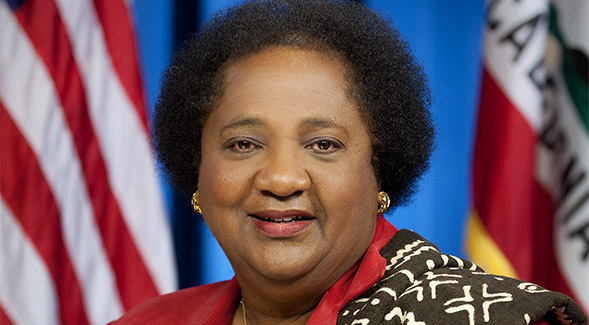Fighting the Fight for California
California Secretary of State Shirley Weber, a professor emerita at SDSU, shares her legacy of advocacy on and off campus and her vision for her new appointment with the state.

When Shirley Weber placed her hand on a 500-year-old Bible and recited the oath of office to be sworn in as California’s secretary of state, she made history.
Professor emerita of Africana Studies at San Diego State University and first elected to the state Assembly in 2012, Weber became the first member of the Black community to serve in the state’s third-highest executive position. Weber is also only the fifth Black person in California history to serve in a statewide office.
During her 40 years as a professor and ultimately the head of SDSU’s Africana Studies Department, Weber was one of the most vocal advocates for expanded and improved support for members of the African American community. Dating back decades, Weber called on SDSU to diversify its student body and faculty and to increase programs and other initiatives designed specifically with the Black community in mind.
The university has changed a great deal over several decades. In addition to attending to the further development of academic programs centering on the experiences and contributions of Black people, SDSU has spent time listening and has launched programming and initiatives to improve the climate for students, faculty and staff. In recent years, the university has introduced the Black Resource Center, established employee resource groups, and introduced new scholarship funds and mentoring opportunities, among other initiatives.
Shortly after taking office, Weber sat down with Aaron Burgin, a communications specialist in the Division of Student Affairs and Campus Diversity, to speak about her legacy of history-making movements and her goals in her new position.
The interview questions and responses have been edited and condensed for clarity.
Burgin: Obviously, it’s a very exciting time for you. You’ve just been appointed secretary of state, the first Black secretary of state in California history. What responsibilities do you feel come with those designations?
Weber: I just constantly ask the question: “What took so long?” It’s not because I was the most qualified Black person who has ever served in the Legislature over the last 170 years. I had some excellent role models in Maxine Waters, Barbara Lee and Yvonne Burke, and a host of individuals who were in the Legislature stood out as legends in their own right.
People begin to realize that African American women across this country have never been given their due. They have struggled and helped others and have been honorable individuals and elected officials – almost every last one of them. And many of them have not been elevated to certain positions. I am thankful Gov. Gavin Newsom decided I was a woman who was worthy of this position and decided to make an offer to me.
Burgin: You’ve obviously had such a rich history with SDSU. What do you think are some of the most pressing issues the university and California State University system face?
Weber: I am extremely indebted to the educational system in California. When you’re a poor kid out of South Central LA, and when you get a chance to get three degrees from UCLA by the time you’re 26 and you only owe $1,250, you are indebted for life. So, I am very indebted to California.
I know the potential that California has to provide an education for every student and that every student we invest in pays dividends over and over again. You can't buy a better investment than to invest in the education of young people, whether that’s K-12 or postsecondary. And California has the capacity to do that because it has a system that, basically, is designed for anyone to get a degree.
I want to make sure our universities are really functioning for all of our students because that's what they were designed for.
Burgin: What are your goals for your first year in the role, and what can you tell us about the group being organized to address reparations?
Weber: Well, you know, my goals since I’ve been in the Legislature, a lot of my stuff has been about the issue of social justice, equal opportunity and fighting for those who traditionally have been lost or left out of the system.
One particular example is around the right to vote. We have some work to do to make sure that every person who wants to vote can vote and be eligible to vote. We just passed Proposition 17, and I was one of the co-authors of the bill that basically gave us the opportunity for those on parole to vote. My goal is to try to make sure that we are putting into place not only these rules and the law we have passed, but that we have put in place a system that encourages so that the system becomes effective. We need to create more opportunities, as we have. And because people now have so many ways to vote, there is no excuse not to vote.
...During my first year – clearly building on that idea of reparations – a task force (the Task Force to Study and Develop Reparation Proposals for African Americans, signed into law by Gov. Gavin Newsom in October 2020) is being formed right now with hopes of using California’s archives to assist in the research and work that needs to be done to better understand what slavery was and how it has existed. We also plan to introduce lecturers to help educate California about slavery, about California’s role in slavery, the damage it did to African Americans – and then begin to talk about what we need to do to remedy.



